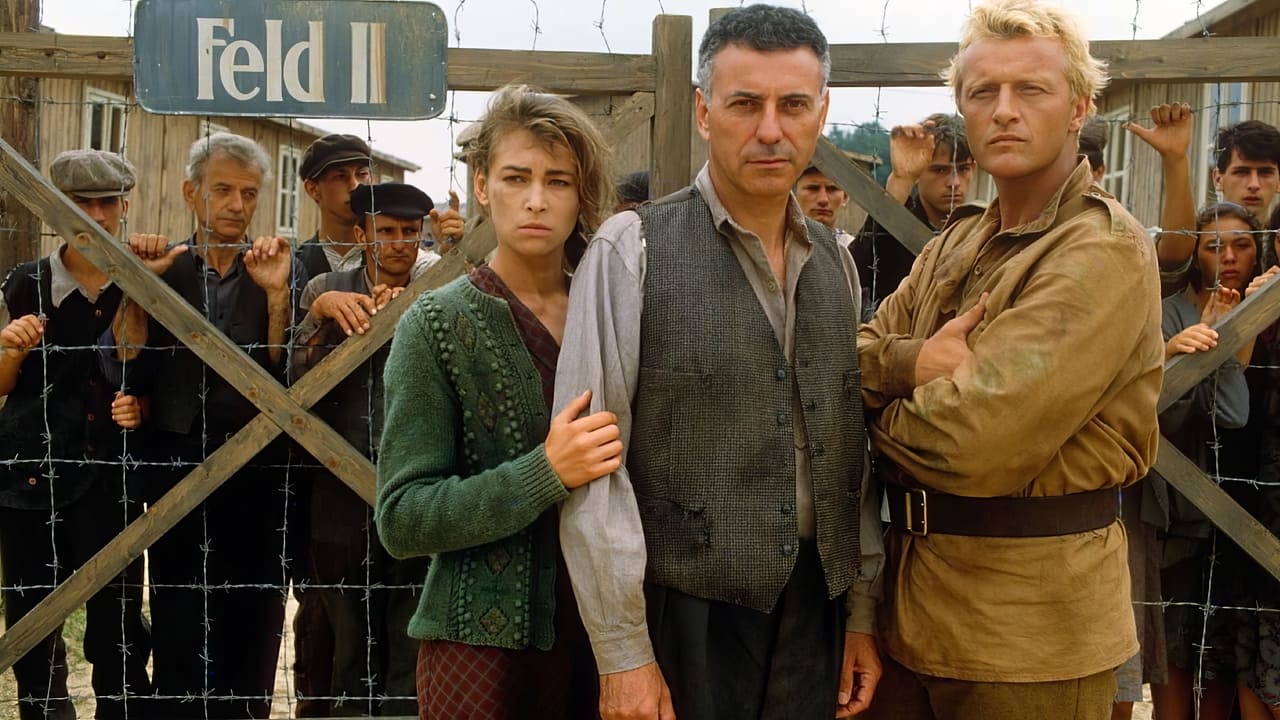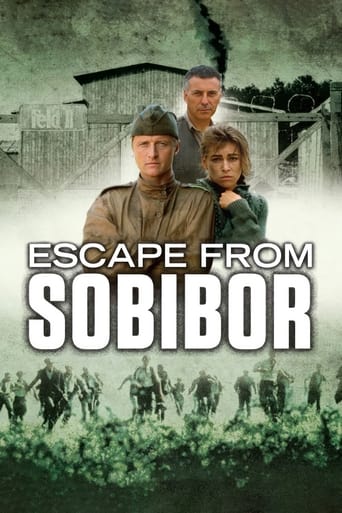SpuffyWeb
Sadly Over-hyped
Dynamixor
The performances transcend the film's tropes, grounding it in characters that feel more complete than this subgenre often produces.
Robert Joyner
The plot isn't so bad, but the pace of storytelling is too slow which makes people bored. Certain moments are so obvious and unnecessary for the main plot. I would've fast-forwarded those moments if it was an online streaming. The ending looks like implying a sequel, not sure if this movie will get one
tomsview
If you didn't know this film was based on fact, you would think it was just typical movie exaggeration.It's an incredible story. Aware that they will eventually all be killed, the Jewish workers at Sobibor extermination camp in 1943 plan to revolt. Their leader, Leon Feldhendler (Alan Arkin) realises that the only way to stop the SS punishing those left behind is for all 600 to escape.When a group of Russian Jewish prisoners of war arrive at the camp, Leon believes that these trained soldiers offer the chance they have been waiting for. He joins forces with their officer 'Sasha' Pechersky (Rutger Heuer) and together they devise a plan to kill the SS men in the camp, which will render the mainly Ukrainian guards leaderless.More than just dealing with the escape, the film recreates the system the Nazis used in all the death camps such as Auschwitz, Treblinka, Belzec as well as Sobibor. The film starts as Jews arriving by train are fooled into thinking they have arrived at a work camp, but in reality they are then selected according to their usefulness with most going straight to the gas chamber, disguised as showers. Their possessions are then sorted by Jewish workers who themselves survive only as long as they are able to perform a service for their Nazi masters.The film has a number of disturbing scenes. A new arrival, although selected to work, searches for his wife and child, until he is informed that they are already dead. When he is shown the glow above the crematorium, he finally realises the true purpose of Sobibor. A young boy on an errand is traumatised when he comes across lines of naked women and children being ushered into the 'showers'.The film is not overly gory or graphic, but we get the picture. Without comparing them, "Escape from Sobibor" is as compelling as Spielberg's "Schindler's List". Both films are about events in the Holocaust that were outside the norm; not many Jews escaped as they did from Sobibor, and not many were saved as were those by Otto Schindler.The only thing that betrays the film's TV roots are a couple of fade-outs for ad breaks; otherwise this is a big scale production with well-handled action scenes. Few films of this kind stick as closely to the known facts; even the romantic interest provided by Joanna Pacula's character, Luka, is true.If I have one criticism it would be Georges Delerue's score, which seems overly emphatic at the end. But that aside, this is a tense, riveting film, which does justice to a desperate act of heroism.
Bene Cumb
It is a British/Yugoslavian film about the mass escape from the extermination camp at Sobibor, the most successful uprising by Jewish prisoners of German extermination camps. It is full of contrasts, both moral and attitude-related, and gives a realistic overview of daily life of Jewish prisoners and their involuntary development from peaceful craftsmen into protagonists and organizers. The escape plan is hard to make out and not everything goes planned - even with Germans who are known for their punctuality and routines. However, if there are programs to kill on the basis on ethnicity, race or religion, you cannot expect leaking or treason, but a unified front against executors.All the cast is evenly strong, beginning with Alan Arkin and Rutger Hauer who received a Golden Globe Award for Best Actor in a Supporting Role (Television).Of course, this harsh film is not for everyone, but it would be useful as an history lesson - as the screenplay is based on real events and written by survivors of this uprising.
Rob van Opzeeland
I will pick my words carefully when reviewing this movie, since I do not mean to offend any person who has lived through the horror the death camps of Belzec, Treblinka, and Sobibor. What happened in the east of Poland during World War II was so horrifying it defies reason, understanding or explanation.So I don't mean to put down the people that lived through these horrors, but examples of heroic Jewish uprisings during the second world war, like the escape from Sobibor, are very rare indeed. That is not to say the Jews were not brave, but simply that they were not given the opportunity for bravery, in a world that turned against them so completely, that even for those who complied to every torturous labor, every outrageous disciplinary measure, each moment could be your last, and fighting against the German oppressors could get your family killed as well.In that respect, this movie gives us a romanticized take on the role of the Jews in World War II. A common criticism of Schindler's List is that it portrays the Jews as nothing more than meek victims, which I think is a strange criticism, since Schindler's List just realistically shows the predicament the Jews were in during the war. My criticism of this film is that it portrays the Jews as victors over a cruel oppressor. With the greatest respect for the hardships these people had to face, most unfortunately, that portrayal is simply not true, even though this film reenacts a historic event that did happen.Taking that into account, this movie is quite honest about the fate of most Jews during the war. It hardly could avoid to show the nasty sides of a death camp like Sobibor. Particularly informative, and historically accurate as far as I understand it, were 2 scenes in the movie. One is a scene at the start of the film that shows the way new arrivals are welcomed with music and promised good treatment, and hot showers. Secondly, the scene in which a little boy is sent over to run an errand at the gas chambers, and we get a glimpse of what went on there. This second scene is also the most horrific scene in the movie, and shockingly graphic. I doubt if a scene as harsh and realistic as that one would make it into any "mainstream" movie made these days.I liked the acting by the main characters, almost all of these are pretty good for a TV movie. Having said that, the portrayal of the SS-officers wasn't very subtle. They were just portrayed as evil beasts feasting on beer, and discussing why it would or would not be okay to sexually abuse Jewish women. Of course those kinds of discussions would have taken place, but there is not one moment showing camaraderie amongst them, or any "pleasant" conversation between them, and this made them little more than cardboard cut-outs.This is where movies like Der Untergang (Downfall), and Schindler's List really rise above the more generic Word War 2 movies. In showing us the human side of the Germans, they can show us what is most frightening about the atrocities of the holocaust : that it was executed by human beings, who were somehow capable of shutting off their conscience when it came to their orders to kill and torture millions of defenseless and innocent people.All in all this isn't a bad movie. It gets a lot of things right that other movies didn't. For example it does show the willingness of some Jews to torture and oppress their fellow men to save their own lives, and to gain favour with the Germans. But it fails to ask the truly hard questions, thereby reducing these painful examples of human weakness to nothing more than a plot-point, and that's too bad. They missed a wonderful opportunity to explore the psychological implications of being on the wrong side.My point is that, on both sides, people behaved as people do. Imperfect, heroic sometimes, but at other times cruel, cowardly, deceiving. It is very rare for a WW2 movie to grasp those nuances, and though this film makes a good effort, in those aspects it didn't succeed.
Artdoag2
I first watched this movie several years ago cuz it had Rutger Hauer in it, and I had liked his performance in Blade Runner. I had also taken a liking to Schindler's List, and I was aiming to explore similar movies dealing with the WW2 death camps (and there's only a handful of them out there).There are some scenes that could have used some polishing up, or seem to have been prepared too hastily. I am under the impression that not enough time was given to developing the Nazi camp staff; we know that they're evil, but a bit more attention to their personalities and specific roles in the camp wouldn't have hurt. I would have like to have seen more focus on Sasha's (Hauer's character) fellow captive soldiers and their involvement in the escape preparation.Escape from Sobibor certainly "shows" itself as a 1980s made-for-TV production, in terms of filming techniques and a lower-budget kind of feel. Nevertheless, the interaction between Hauer and Alan Arkin (the civilian leader of the escape) is solid, and the supporting characters (especially the guy who looks a lot like Fred Ward) come across as very likable. The death camp looks eerily authentic and resembles images I have seen in history books and documentaries. The concerns of life and death voiced by the Jews truly hits home, and the final 15 minutes of the escape are emotionally striking. The narration which describes the fates of some of the key survivors of the ordeal perfectly brings the movie to a close.I give Escape from Sobibor a 7 because of its honest and poignant subject matter. If you haven't seen it, definitely give it a look.

